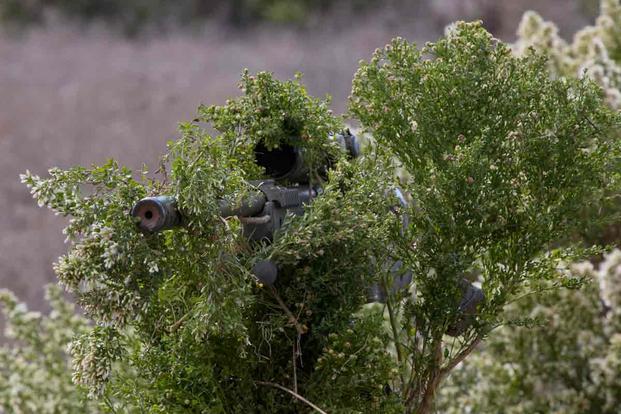The Marine Corps is getting rid of one of its most elite and storied jobs -- the scout sniper.
Official message traffic leaked to social media last week described a switch from scout sniper platoons to what will only be known only as "scout platoons."
The change is part of Force Design 2030 (FD2030), the Marine Corps' ongoing and controversial effort to reinvent the service for future warfare. The decision has already triggered concerns from within the ranks about the loss of sniper capabilities.
Read Next: Army Urges Soldiers to Check Their Records in New HR System After String of Glitches
All three training locations for the grueling 3-month Scout Sniper course at Camp Pendleton, California; Camp Lejeune, North Carolina; and Marine Corps Base Quantico, Virginia, will stop admitting new students starting in fiscal 2024, according to the message.
A spokesman for the Marine Corps confirmed that the scout sniper platoons would be eliminated, but said that the underlying skill set would be integrated elsewhere in the service.
"Precision rifle capability will remain within the infantry company, and the Marine Corps will continue to maintain school-trained snipers within Marine Reconnaissance and Marine Special Operations units," said service spokesman Capt. Ryan Bruce.
Bruce added that the Marine Corps' Training Command "is in the process of analyzing both the new scout platoon mission and enduring requirements for precision marksmanship capabilities to determine the performance standards and training options necessary."
Snipers are qualified to venture 10 to 20 miles beyond the forward line of troops, into the enemy's domain. Reconnaissance skills, like days-long observation of enemy outposts, are tough to maintain, as is the ability to shoot long distances with different sophisticated rifle systems. They're trained in how to call for fire and close-air support, and have to understand complex mission planning requirements.
The messages outlining the changes, posted to social media, described the move as being driven by the two-year-long "Infantry Battalion Experimentation" the Corps undertook, which "showed the scouting capabilities in the newly designed Infantry Companies were insufficient to offer the Battalion continuous all-weather information gathering."
Unlike tanks and select artillery capabilities, which were publicly put on the chopping block early during the force design rethink, the Marine Corps has remained mostly quiet on the future of snipers until now.
The new "scout platoons" will consist of 26 Marines. Infantry companies will no longer have Marines trained as snipers, but they will keep "designated marksmen."
It's not the first time the Corps has dropped the scout snipers.
The Marine Corps previously canned the program after World War I, World War II and Vietnam, anticipating that future warfare wouldn't require snipers.
Scout snipers are a storied part of Marine Corps history.
During WWII, scout snipers known as the "40 Thieves on Saipan" operated far behind enemy lines and grew famous for their silent killing techniques. And before "American Sniper," there was Carlos Hathcock, a Vietnam War Marine with 93 confirmed kills (and up to 300 unconfirmed kills), and Chuck Mawhinney, another Vietnam sniper with more than 100 confirmed kills.
The Marine Corps' commandant, Gen. David Berger, has been vocal about wanting infantry Marines to become well-versed in multiple weapons systems -- less specialized and more "commando-like."
But some Marines, who spoke with Military.com about the service's decision to eliminate scout snipers on condition of anonymity, say that kind of mindset highlights a misunderstanding of the extreme capabilities snipers provide and the importance of their uncompromising training.
"We're talking out of both sides of our mouth here," said one Marine gunner, a weapons expert. "We don't want to divest the equipment because we know we need that capability," he said, pointing out that tough-to-master sniper rifles aren't going anywhere.
"You just can't pick up an advanced sniper rifle and hand it to somebody and expect them to be able to do what a trained sniper can do," the Marine added.
Instead, the Corps will rely on training up Marines through the two-week-long Designated Marksman course.
It's unclear how "scout platoons" will be trained, as there is currently no stand-alone "scouting" course within the Marine Corps.
Scout snipers have faced a serious shortage of numbers in recent years, which some say is due in part to a too-high attrition rate from the scout sniper schoolhouses. Fewer Marines finishing the course means fewer snipers overall.
Others see it differently.
"Part of this is a retention problem," said a Marine officer who's involved with current scout sniper training efforts. The Marine said that, because being a sniper is a secondary responsibility, it gets short shrift from higher-ups.
"A lot of them want to keep doing their jobs as snipers," the Marine added. "So they get out, and they go to the SEALs, Army Special Forces or MARSOC. I've seen it happen multiple times. They don't want to stay because they're not valued properly."
Previous reporting suggests there may be anywhere from 150 to 300 scout snipers in the Marine Corps. Save for snipers produced through stand-alone courses with Reconnaissance and MARSOC units, numbers will likely plummet, given the closing of the sniper schools.
In 2018, then-Commandant Gen. Robert Neller sought to increase scout snipers' numbers, amidst the shortage. The Marine Corps Warfighting Laboratory reportedly recommended an increase in sniper platoon numbers around the same time.
While snipers are set to remain at MARSOC and Recon, Marines point out that MARSOC snipers are likely to be under the purview of their Special Operations Command structure, and aren't likely to be easily dispersed throughout the service. And while Recon will maintain snipers, their small numbers and specialized, high-level missions leave the majority of Marine infantry units out in the cold.
"I think a lot of senior commanders don't really understand the full capability that a sniper brings to them," lamented a senior enlisted sniper.
"Snipers can't be mass-produced," he continued. "They're trying to mass-produce capabilities and cutting corners, thinking that numbers on a spreadsheet is what will win wars. But it's not; all it's going to do is fill body bags."














